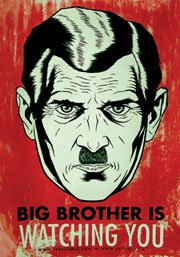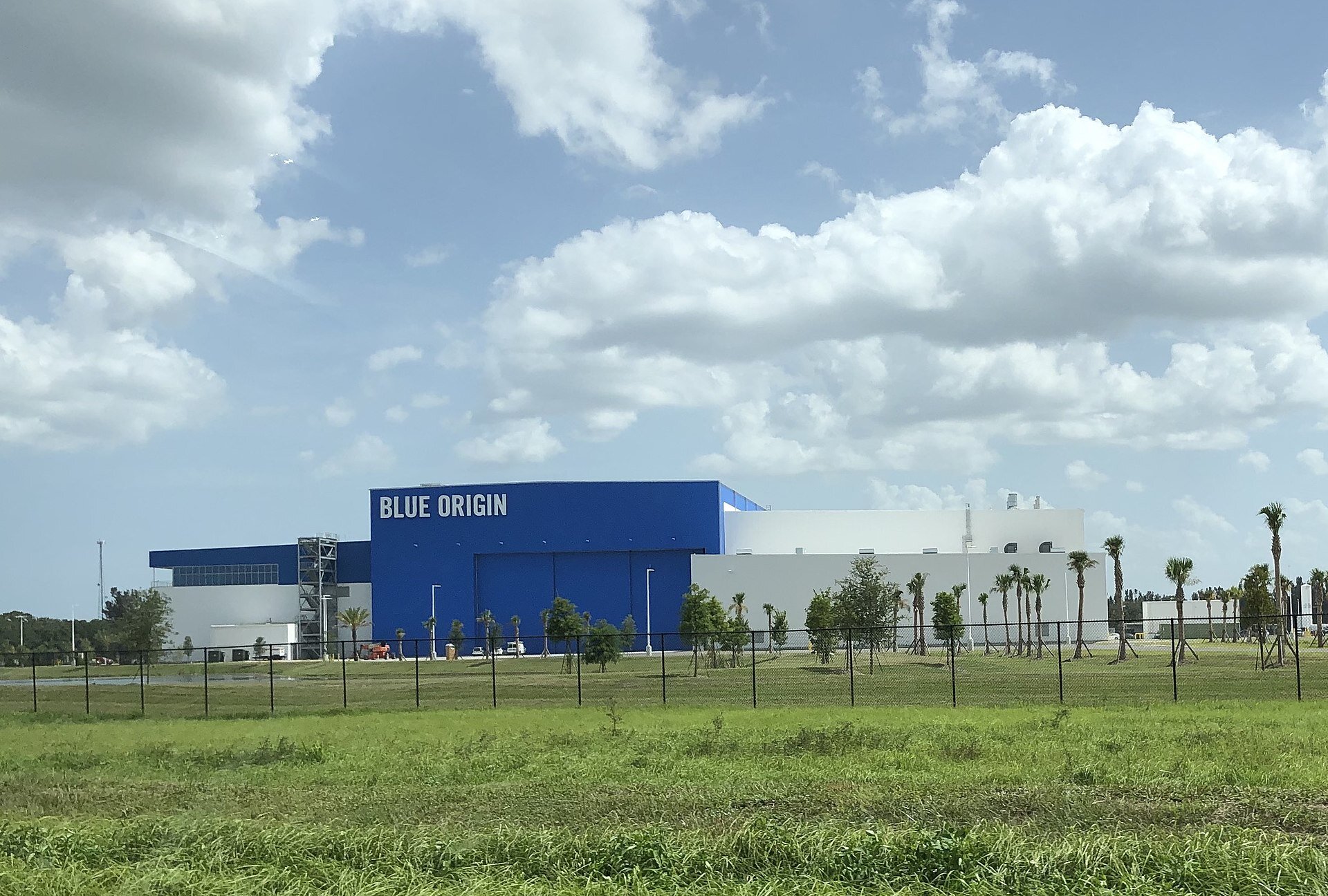
Companies’ creepy surveillance of their own workers
The evil dictator in George Orwell’s 1984
Via OtherWords.org
For generations, workers have been punished by corporate bosses for watching the clock. But now, the corporate clock is watching workers.
Called “digital productivity monitoring,” this surveillance is done by an integrated computer system including a real-time clock, camera, keyboard tracker, and algorithms to provide a second-by-second record of what each employee is doing.
Amazon founder Jeff Bezos pioneered use of this ticking electronic eye in his monstrous warehouses, forcing hapless, low-paid “pickers” to sprint down cavernous stacks of consumer stuff to fill online orders, pronto — beat the clock, or be fired.
Terrific idea, exclaimed taskmasters at hospital chains, banks, tech giants, newspapers, colleges, and other outfits employing millions of mid-level professionals.
They’ve been installing these unblinking digital snoops to watch their employees, even timing their bathroom breaks and constantly eying each one’s pace of work. They’ve plugged in new software with such Orwellian names as WorkSmart and Time Doctor to count worker’s keystrokes and to snap pictures every 10 minutes of workers’ faces and screens, recording all on digital scoreboards.
You are paid only for the minutes the computers “see” you in action. Bosses hail the electronic minders as “Fitbits” of productivity, spurring workers to keep noses to the grindstone, and also to instill workplace honesty.
Only… the whole scheme is dishonest.
No employee’s worthiness can be measured in keystrokes and 10-minute snapshots! What about thinking, conferring with colleagues, or listening to customers? No “productivity points” are awarded for that work.
For example, The New York Times reports that the multibillion-dollar United Health Group marks its drug-addiction therapists “idle” if they are conversing off-line with patients, leaving their keyboards inactive.
Employees call this digital management “demoralizing,” “toxic,” and “just wrong.” But corporate investors are pouring billions into it. Which group do you trust to shape America’s workplace?
OtherWords columnist Jim Hightower is a radio commentator, writer and public speaker.
Sam Pizzigati: Amazon’s business model can kill
From OtherWords.org
BOSTON
Old-school home-improvement contractors have a piece of folk wisdom they love to share with prospective clients. “Listen,” they like to say. “I can do this job fast, I can do it cheap, or I can do it well. But I can’t do all three.”
This wisdom has been around forever. But not everyone gets it — take billionaire Jeff Bezos. His Amazon empire prides itself on delivering good results fast and cheap.
That works well enough for Bezos, now worth around $200 billion. And Amazon consumers, the company PR maintains, can get almost whatever they want quickly and cheaply. But for Amazon workers — and our broader society — Amazon’s empire building has been anything but good.
That became disastrously apparent this month, when a tornado swept through Edwardsville, Ill., leaving six Amazon warehouse workers dead. Debris from their workplace turned up “tens of miles” away, the National Weather Service reported.
Unfortunately, this tragedy should not have taken anyone by surprise.
Why did Amazon locate its Edwardsville operations right in Tornado Alley? No mystery there. Edwardsville’s plentiful acreage and easy access to interstate highways, airports, and other transport offered Amazon the promise of speedy delivery times and lower delivery costs.
Check fast. Check cheap. But the warehouse went up with no special attention to tornado safety. That would have raised the cost.
OSHA — the federal occupational health and safety agency — has now begun an investigation. Since the deaths in Edwardsville, Amazon workers throughout the southern Illinois area have been ripping the company for failing to conduct tornado drills and expecting workers to keep working even after alarms ring out.
Amazon’s “storm shelter” spaces for Edwardsville workers turned out to have another name: bathrooms. Moments before the tornado’s arrival, Edwardsville worker Craig Yost told local news, Amazon supervisors were directing people into their worksite’s bathroom “shelters.”
“The walls caved in, and I got pinned to the ground by a giant block of concrete,” Yost said. “On top of my left knee was a door from the bathroom stall, and my head was on that with my left arm wrapped around my head. I could just move my right hand and foot.”
Meanwhile, the company has been actively exercising its considerable power to prevent the one turn of events that could reliably keep Amazon on its safety toes: a union. Earlier this year, Amazon quashed a union drive at its Bessemer, Ala., warehouse so egregiously that the National Labor Relations board has ordered a do-over on the election.
But the problem goes beyond Amazon. Our nation’s corporate giants have been on a ferocious 50-year offensive against collective bargaining.
In the mid-20th Century, over a third of America’s private-sector workers belonged to unions. Now only 6.3 percent of private-sector workers carry union cards, despite polling data showing that the share of nonunion workers who want a union at their worksite has increased markedly.
Corporate America’s squeeze on unions has kept wages low, share prices high and compensation for top executives at stratospheric levels. Earlier this year, Institute for Policy Studies research revealed that CEOs at America’s 100 largest low-wage employers saw their personal compensation jump by $1,862,270 in 2020.
Over the past year, Jeff Bezos has seen his wealth soar by over $4 billion — seven times the annual budget of OSHA, the agency investigating the disaster at his Edwardsville warehouse. So here’s an idea for lawmakers in Washington: A 5 percent annual federal wealth tax on those Bezos billions could quadruple the annual OSHA budget — and then quadruple it again.
Amazon’s relentless quest to sell goods fast and cheap has rewarded Bezos tremendously, but it’s come at a huge cost for the rest of us. If the company rebuilds its Edwardsville warehouse, Bezos should listen to his handyma\
Sam Pizzigati, who is based in Boston, co-edits Inequality.org at the Institute for Policy Studies. His latest books include The Case for a Maximum Wage and The Rich Don’t Always Win.
Sam Pizzigati: Ego-space-tripping billionaires want more tax breaks
Jeff Bezos’s space-project production facilities near the Kennedy Space Center, in Florida
— Photo by MadeYourReadThis
Via OtherWords.org
BOSTON
Three of the richest billionaires on Earth are now spending billions to exit Earth’s atmosphere and enter into space. The world is watching — and reflecting.
Some charmed commentators say the billionaires racing into space aren’t just thrilling humankind — they’re uplifting us. The technologies they develop “could benefit people worldwide far into the future,” says Yahoo Finance’s Daniel Howley.
But most commentators seem to be taking a considerably more skeptical perspective.
They’re dismissing the space antics of Richard Branson, Jeff Bezos and Elon Musk as the ego trips of bored billionaires — “cynical stunts by disgustingly rich businessmen,” as one British analyst puts it, “to boost their self-importance at a time when money and resources are desperately needed elsewhere.”
“Space travel used to be about ‘us,’ a collective effort by the country to reach beyond previously unreachable limits,” writes author William Rivers Pitt. “Now, it’s about ‘them,’ the 0.1 percent.”
The best of these skeptical commentators can even make us laugh.
“Really, billionaires?” comedian Seth Meyers asked earlier this month. “This is what you’re going to do with your unprecedented fortunes and influence? Drag race to outer space?”
Let’s enjoy the ridicule. But let’s not treat the billionaire space race as a laughing matter.
Let’s see it as a wake-up call — a reminder that we don’t only get billionaires when wealth concentrates. We get a society that revolves around the egos of the most affluent and an economy where the needs of average people don’t particularly matter.
Characters like Elon Musk, notes Paris Max, host of the Tech Won’t Save Us podcast, are using “misleading narratives about space to fuel public excitement” and gain tax-dollar support for various projects “designed to work best — if not exclusively — for the elite.”
The three corporate space shells for Musk, Bezos and Branson — SpaceX, Blue Origin and Virgin Galactic — have “all benefited greatly through partnerships with NASA and the U.S. military,” notes CNN Business. Their common corporate goal: to get satellites, people, and cargo “into space cheaper and quicker than has been possible in decades past.”
Branson is hawking tickets for roundtrips “to the edge of the atmosphere and back” at $250,000 per head. He’s planning some 400 such trips a year, observes British journalist Oliver Bullough, about “almost as bad an idea as racing to see who can burn the rainforest quickest.”
The annual U.N. Emissions Gap Report last year concluded that the world’s richest 1 percent do more to foul the atmosphere than the entire poorest 50 percent combined. Opening space to rich people’s joyrides would stomp that footprint even bigger.
Bezos and Musk seem to have grander dreams than mere space tourism — they’re looking to colonize space. They see space as a refuge from an increasingly inhospitable planet Earth. And they expect tax-dollar support to make their various pipe dreams come true.
How should we respond to all this?
We should, of course, be working to create a more hospitable planet for all humanity. In the meantime, advocates are circulating tongue-in-cheek petitions that urge terrestrial authorities not to let orbiting billionaires back on Earth.
“Billionaires should not exist…on Earth or in space, but should they decide the latter, they should stay there,” reads one Change.org petition nearing 200,000 signatures.
Ric Geiger, the 31-year-old automotive-supplies account manager behind that effort, is hoping his petition helps the issue of maldistributed wealth “reach a broader platform.”
Activists like Geiger are going down the right track. We don’t need billionaires to “conquer space.” We need to conquer inequality.
Sam Pizzigati, based in Boston, is an associate fellow and co-editor of Inequality.org at the Institute for Policy Studies. He’s the author of The Rich Don’t Always Win and The Case for a Maximum Wage.
This op-ed was adapted from Inequality.org and distributed by OtherWords.org.
The mobster vs. the monopolist
Mural "Purchase of Land and Modern Tilling of the Soil" (1938), by William C. Palmer, in the lobby of the Arlington, Mass., Post Office, a Colonial Revival building (see exterior below) that was opened in 1936. Many post offices erected or renovated during the New Deal’s Works Progress Administration had art work such as this mural, in part to help keep artists employed during the Great Depression.
From Robert Whitcomb’s Digital Diary, in GoLocal24.com:
Maximum Leader Trump hates the U.S. Postal Service, which he alleges undercharges Amazon, run by Jeff Bezos, whom Trump envies and so detests And Mr. Bezos owns The Washington Post, which tries to vigorously report on the Trump mob. So the mobster-in-chief rejects a bailout of the Postal Service, which is far more essential to America than many of the institutions being bailed out. And he would love to hamstring efforts to encourage voting by mail this pandemic year in lieu of the usual crowds at polling places, because he thinks, correctly, that those votes will tend to be against him.
Oh yes. Trump votes by mail himself. I myself think that voting in person is better – except in a pandemic. That’s not only because it might be less vulnerable to fraud but also because showing up to vote at a polling place is a celebration of democracy.
In any event, the Postal Service, whatever its flaws, is an important part of America’s connective tissue, especially for the underprivileged, and needs to be protected.
By the way, none of this is to say that Amazon, like Google, Facebook and some other tech-based companies that have become so huge in the past two decades, aren’t too powerful and shouldn’t be broken up, as the now hollow Antitrust Division of the U.S. Justice Department would have done a half century ago.








